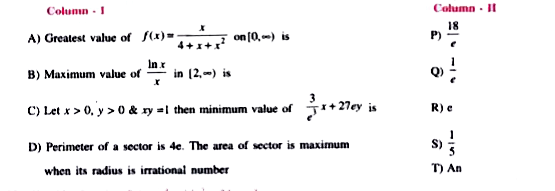If f(x) is differentiable function wher it is continuous and f(c1)=f(c2)=0,f'(c1).f(c2)<0 if f(c1)=5andf(c2)=0(c1<c2)
If is continuous in [c1−1,c2+1]andf'(c1)−f'(c2)>0 then minimum numbers of roots of f(x) = 0 in [c1−1,c2+1] is Solution in Telugu
1
2
3
4
The correct Answer is:B
Step by step video, text & image solution for If f(x) is differentiable function wher it is continuous and f(c_(1))=f(c_(2))=0,f'(c_(1)).f(c_(2))lt0 if f(c_(1))=5andf(c_(2))=0(c_(1)ltc_(2)) If is continuous in [c_(1)-1,c_(2)+1]andf'(c_(1))- f'(c_(2))gt0 then minimum numbers of roots of f(x) = 0 in [c_(1)-1,c_(2)+1] is by Maths experts to help you in doubts & scoring excellent marks in Class 11 exams.
Topper's Solved these Questions
- BOOK - AAKASH SERIESCHAPTER - MAXIMA AND MINIMA EXERCISE - LECTURE SHEET (EXERCISE -II) (INTEGER TYPE QUESTIONS)3videos
MAXIMA AND MINIMA
- BOOK - AAKASH SERIESCHAPTER - MAXIMA AND MINIMA EXERCISE - PRACTICE SHEET (EXERCISE -I) (LEVEL -I) (STRAIGHT OBJECTIVE TYPE QUESTIONS)100videos
MAXIMA AND MINIMA
- BOOK - AAKASH SERIESCHAPTER - MAXIMA AND MINIMA EXERCISE - LECTURE SHEET (EXERCISE -II) (MATRIX MATCHING TYPE QUESTIONS)3videos
MAXIMA AND MINIMA
- BOOK - AAKASH SERIESCHAPTER - MAXIMA & MINIMAEXERCISE - EXERCISE-III35videos
MAXIMA & MINIMA
- BOOK - AAKASH SERIESCHAPTER - MEAN VALUE THEOREMSEXERCISE - PRACTICE SHEET (EXERCISE-I (LEVEL-II (MORE THAN ONE CORRECT ANSWER TYPE QUESTIONS ) )2videos
MEAN VALUE THEOREMS
Similar Questions
Let f(x) be a cubic polynomial which has local maximum at x=-1 and f(x) has a local minimum at x=1 , If f(-1) =10 and f(3) =-22, then one fourth of the distance between its two horizontal tangents is
04:28View Solutionf(x)=x5+5x(x≠0) is increasing in
04:06View SolutionMatch the max l min value of function in Column I with corresponding values in Column -II
 06:38View Solution
06:38View SolutionThe maximum slope of the curve y=−x3+3x2+9x−27 is
04:24View SolutionGiven f(x) = 4- ((1)/(2) - x)^(2//3) , g(x) = {:{((tan[x])/(x),","x cancel(=)0),(1,","x=0):}" "h(x)={x}, k (x) = 5^(log_(2)(x+3))
Then in [0,1], Lagrange's mean value theorem is not applicable to (where [.] and {.} represents the greatest integer functions and fractions part functions, respectively )04:35View SolutionIf f(x) is a differentiable function wherever it is continuous and f'(c_(1))=f'(c_(2))=0f''(c_(1))*f''(c_(2)) 0 then minimum number of roots of f'(x)=0 in [c_(1)-1,c_(2)+1] is
View SolutionProve that (C_(0)+C_(1))(C_(1)+C_(2))(C_(2)+C_(3))(C_(n-1)+C_(n))=((n+1)^(n))/(n!)*c_(0)*C_(1)*C_(2).........
02:44View SolutionIf (1+x+x^(2))^(n)=(C_(0)+C_(1)x+C_(2)x^(2)+.........) then the value of C_(0)C_(1)-C_(1)C_(2)+C_(2)C_(3)...
05:36View SolutionIf C0,C1,C2,..........Cn, are the Binomial coefficients in the expansion of (1+x)n, n being even, then C0+(C0+C1)+(C0+C1+C2)+.....+(C0+C1+C2+.......+Cn−1) is equal to
02:53View SolutionLet f be a differentiable function on [0,1] s.t. f(0)=f(1)=0 and f(14)=f(34)=1. Show that c1,c2,c3 in (0, 1) s.t. f'(c1)+f'(c2)+f'(c3)=0.
View SolutionIf (1+x)n=C0+C1x+C2x2+…..+Cnxn, then C0−(C0+C1)+(C0+C1+C2)−(C0+C1+C2+C3)+…..(−1)n−1(C0+C1+……+Cn−1) is (where n is even integer and Cr=.nCr)
View SolutionIf (1+x)n=C0+C1x+C2x2+C3x3+…+Cnxn, then
C0−(C0−C1)+(C0+C1+C2)−(C0+C1+C2+C3)+...+(−1)n−1
(C0)+C1+C2+...+Cn−1) , when n is even integer isView SolutionIf (1+x)n=C0+C1x+C2x2+.....+Cnxn then show :
C0C1+C1C2+C2C3+.....+C_(n−1)Cn=(2n)!(n+1)!(n−1)!View SolutionIf C0,C1,C2,…,Cn are the binomial coefficients in the expansion of (1+x)n⋅n being even, then C0+(C0+C1)+(C0+C1+C2)+….+(C0+C1+C2+…+Cn−1) is equal to :
03:22View SolutionIf f(x) is a differentiable function wherever it is continuous and f'(c1)=f'(c2)=0,f''(c1).f''(c2)<0,f(c1)=5,f(c2)=0and(c1<c2)
If f(x) is continuous in [c1,c2]andf''(c1)−f''(c2)>0, then minimum number of roots of f'(x)=0 in [c1−1,c2+1] isView SolutionIf f(x) is a differentiable function wherever it is continuous and f'(c1)=f'(c2)=0,f''(c1).f''(c2)<0,f(c1)=5,f(c2)=0and(c1<c2)
If f(x) is continuous in [c1,c2]andf''(c1)−f''(c2)<0, then minimum number of roots of f'(x)=0 in c1−1,c2+1] is02:25View Solution

